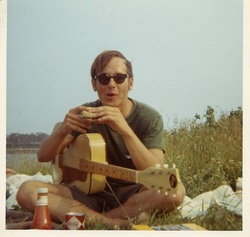Tim was one of the most incredible and wonderful people I've ever met. His mother had encouraged him to play cello at an early age, along with piano and sax. He was offered a full scholarship at Curtis Institute of Music but he chose to study science instead and when I met him he was one of the most respected scientists at USGS in Woods Hole.
But Tim was something else too - a kid who was way more American than most of us in spite of being of Chinese heritage. He knew every character of every TV show in the 1960s, had an infectious sense of humor and was absolutely loved by everyone he came in contact with, including my son Matt when Matt was a little boy. Tim was a big guy, which made him even more "larger than life." In terms of pop culture in this country, he was an absolute student and lover of American pop music and jazz - and he could play ANY of it really, really well. His "Chinese Elvis" is still talked about by those of us who were lucky enough to experience his hilarious and amazing performances.
Tim, Andy, John, Candy and I split off from the Geotones to form a band called "Bits n' Pieces" (after the old Dave Clark Five song), playing a mix of all types of 1960s music. It was the most pure fun I've ever had in any music group and we developed quite a local following, playing places like the now long-gone Hunt Club and Molly's, which became more or less our home base. We were pretty good and worked hard on getting our versions of the tunes as close to the originals as possible. It was with Bits n' Pieces that I learned the importance of tight playing, including definite beginnings and endings to songs, planned solos and responding to the other players in a band, something we practiced diligently.
Perhaps our most memorable gig was a wedding we played in Upstate New York. The bride was someone who had worked with Tim and Candy at USGS and she was determined to have us play the reception regardless of the cost. It was like something out of a situation comedy or perhaps an Adam Sandler movie.
The reception was to be held under a large rented tent in the bride's parents' back yard. I don't think we had even unloaded our equipment when the father of the bride came out of the house to greet us, with a huge pitcher of beer in each hand, which he all but demanded we drink. I knew this one was going to be "Fun, Fun, Fun"!!
The beer kept flowing as we set up. Then it began to rain. The wedding over, guests began arriving and filled with tent. We began to play.
The details are a little hazy from that point on, but I do clearly remember finishing one set with "Born to be Wild" and Yours Truly climbing on top of my Fender Showman amp and trying to play the fastest, loudest and craziest solo ever. By that point the grass dance floor had turned to mud and I remember the bride and bridesmaids kicking off their shoes and dancing barefoot in the mud. Rock n' roll, baby!!
The next day we had to make the long trek back to the Cape and thank goodness I wasn't driving because my head felt like someone had taken a sledge hammer to it. I think we all felt the same but it was the most fun gig I've ever played.
A year or so later Tim (who was a couple credits short of a Doctorate in Marine Science) announced he had decided to ditch the whole science thing and try to actually make money. He had married a young woman who worked in the office at USGS, a wonderful lady named Kim who my wife had taught in 5th grade. They were made of each other.
In his usual way, Tim had seen no roadblocks to what he wanted to do and soon was accepted to Stnaford Business School, from which he graduated with high honors and before too many years was the CEO of Unical Petroleum. For our part, we tried to keep Bits n' Pieces going with a couple new members but without Tim's presence it just wasn't the same.
Then one day I got some news. Tim had died suddenly in his office at Unical after a lunchtime hockey game. It was devestating for all who knew him.
I still think of him often and miss him greatly. What I learned, with his help, was the pure joy of playing music and how an audience and a band can feed off each others' energy. I think I'm still trying to recapture those moments.
Miss you, Tim.
Tomorrow - the bizarre - I promise!
Peace & good music
Gene

 RSS Feed
RSS Feed